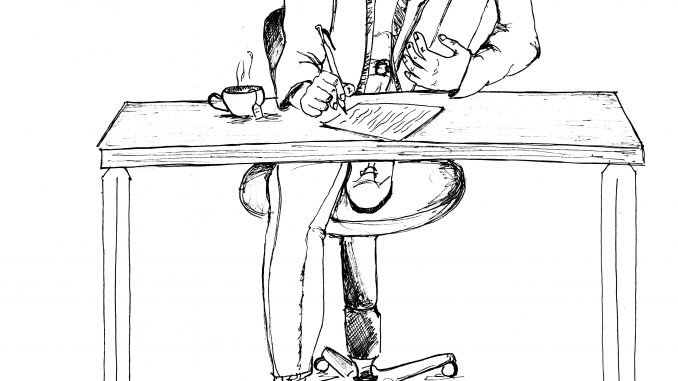
I’d like to think my last words to her were, “I love you,” but I can’t be so sure.
When I hugged her on Easter Sunday, I didn’t think that would be the last time I’d feel her embrace or see her in front of me. At 14, you tend not to.
We let go of each other and I darted down the steps of her condo. She was fairly short and had these really adorable doe eyes that matched her brown hair. I still wish I got her hands. They were dainty and feminine and she loved wearing rings to show them off.
The staircase was an off-white color, and the handrail jiggled. I still remember the smell of lumber and drywall from new construction that lingered for the short time she lived there. It mixed with the smell of daffodils – she kept a bouquet on the cherry wood table.
A couple days later, I was sitting in my freshman science class, studying for a practical exam, when my teacher answered a phone call from the main office.
“Patricia Madej? Yeah, she’s here.”
I’m not sure if it was a premonition or a mix of common sense – she hadn’t answered the phone for two days – that told me I was moments away from finding out that my mom wouldn’t be there that year to watch me perform in the spring musical. She wouldn’t be there to help me choose a dress for my freshman formal. She wouldn’t be there to help me with my college applications. She wouldn’t be there to meet my future children or husband. She just wouldn’t be there.
April 13 will mark the six-year anniversary of my mom’s passing. And with each fleeting moment, it’s becoming harder to remember what her face looked like, or what her voice sounded like. God, I wish I remembered what her laugh was like. She always thought Seinfeld was funny.
I’m older now, so getting a waft of her Estee Lauder perfume or hearing U2 – her favorite band – come on the radio doesn’t feel like the lethal dose of novocaine that it once did. Instead, my mind’s working a little differently.
Recently, I’ve caught myself moving my hands a certain direction, flicking my wrists back. Or, I’ll place my foot up on my calf like a flamingo when I wash dishes. I toss my head back when I laugh. And, I’ve only now realized that those actions feel strangely familiar. They feel nostalgic. They feel good.
 After my mom would get done her mid-afternoon shower, she’d make her way downstairs to boil water for a hot cup of tea. The toaster popped while she grabbed cottage cheese out of the fridge and sliced some radishes for a sandwich. As a kid, I watched her walk fluidly about the kitchen and make camp at the table, usually with an issue of In Touch by her side. But before she took that first bite, she’d place one foot on the chair, knee hugged closely to her face, other dangling below.
After my mom would get done her mid-afternoon shower, she’d make her way downstairs to boil water for a hot cup of tea. The toaster popped while she grabbed cottage cheese out of the fridge and sliced some radishes for a sandwich. As a kid, I watched her walk fluidly about the kitchen and make camp at the table, usually with an issue of In Touch by her side. But before she took that first bite, she’d place one foot on the chair, knee hugged closely to her face, other dangling below.
On colder nights, I make a cup of tea – usually raspberry – when I sit at a desk to do my homework. I’ll put on my slippers, spread out my books and place one foot on the chair, knee hugged closely to my face, the other dangling below. The tea isn’t what’s most comforting anymore.
She made the same peculiar gestures and motions that I do, but I’m only now reminded of her when I make them.
My psychology professor touched on memory this semester, so I asked him if this new way of remembering my mom was unusual. He said it’s not.
“You just change over time and as you change, the way you’re trying to retrieve it gets a little different,” he said. “You’re a woman now. You were a girl then.”
Right now, my movements remind me of intimate memories of my mom, and they’re clearer than any picture or video. It’s OK that I don’t remember how her laugh or voice sounded, because by laughing myself, I remember that her large, brown eyes bulged and her round, chipmunk cheeks took over her entire face. She’d make a shopping list and while she thought about how much sugar and chicken we needed for the week, she’d bite her nails. I do that, too.
I look like her, and that’s certainly genetic, but whether my actions are too, who knows? My professor said it’s more likely that I observed what she did and tucked them away for later. And as my life continues, the memory of her will become more distant, but there will be other triggers, he said, like when I have children of my own. Especially a daughter.
“It’ll be hard, but you’ll remember her until you die,” he said.
I left his office and went to the bathroom before biking back home. I washed my hands in the dimly-lit area – one faded, yellow chair illuminated in the corner – and looked up in the mirror. I wiped the eyeliner from the bottom of my eyes, large like saucers. My wavy hair cascaded across my scarf. I stared a little longer than usual.
I smiled.
Patricia Madej can be reached at patricia.madej@temple.edu or on Twitter @PatriciaMadej.


<3